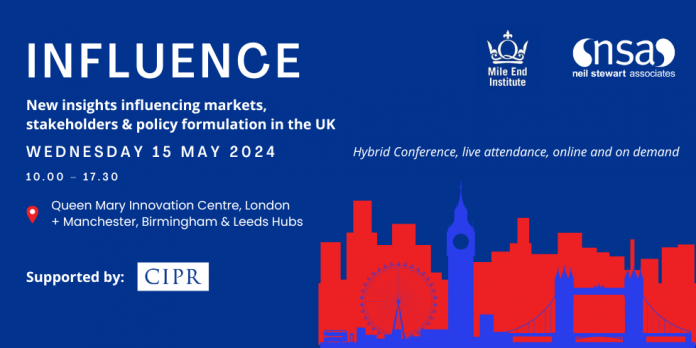Are you in control of your narrative?
Influence Conference: Tools and Insights for Influencing Policy Formulation in UK Government
Date: Wednesday 15 May 2024
Venue: Queen Mary Innovation Centre, London; + Networking/Viewing Hubs in Manchester, Birmingham and Leeds for those who can’t be in London;
Also available to watch online Live and On Demand
On 15th May you can find out from leading PR experts how to build, sustain and change narratives.
How does your organisation see itself, and how do others see your organisation. They are not always the same. The Robert Burns’ question should be on every PR wall and is certainly on every politician’s wall – “o wad some pow’r the giftie gie us to see oursels as ithers see us!”. This could be the founding narrative for the polling industry that so many rely on to tell us how we are seen.
Controlling and managing your narrative, or your place in a wider narrative, through your trade or professional association, is the overarching challenge for most people in PR, although most would seldom express it in those terms.
All the tools we use from polling to press stories, websites, presence on X/Twitter, to newsletters all have to operate to sustain or develop or change an established narrative of who you are, what you do and what virtue you represent, what contribution you make to justify being listened to and respected. Without a clear grip on your narrative vast resources can be wasted and will not save you from a collapsing narrative.
Every organisation has its own narrative and some have powerful founding narratives. Florence Nightingale in Crimea for Nursing. The trade unions founding and funding the Labour Party. The Rochdale pioneers founding the Co-Op movement. Richard Branson building Virgin from record shops, to trains, to broadband and phones, to space ships.
Smart people together creating or inventing something bigger than the sum of their parts. The heroes of their own narrative. The origin of esteem and self-worth that bonds people in organisations together, sustains their image of themselves throughout their careers.
In the public domain whether you are Elon Musk, or Angela Rayner you can expect your narrative to be challenged, contested and both are surrounded by PR people building or defending the narrative.
A powerful but fragile thing. Entrenched and difficult to change when change is needed.
Often the challenge is to change two narratives, the story your members or staff tell themselves, and you might have created or be the guardian of, (Midwives are angels from Call the Midwife) and the narrative the public, press or key stakeholders have of you (Midwives boss women about childbirth and breastfeeding and hold back choice in emergency care).
Nowhere is this more brutally demonstrated that in the implosion of the CBI. The CBI I first knew was “The voice of British business”. The business leg of corporate big business in Britain with the TUC and the government as two other legs. Representing big business (which was still a respected thing in those days) in a series of corporate agreements on how parts of the economy should be run.
Mrs Thatcher put an end to that. Since then the CBI, like many other organisations has been on a journey trying to find a narrative to keep itself relevant, listened to and justify its role to members.
The CBI embarked on a changed narrative journey to being a leadership voice for a more caring employment environment, best practice in company HR, helping companies see the talent in employees, not just the numbers and profit margins, and building workplaces that repaired many of societies inequalities affecting people of different colours, sexualities, and genders. Changing its members as much as changing government policy.
The fragility off the change exploded publicly with one allegation against the CBI director general. A perceived failure to live up to their new narrative and values led to government cutting off the CBI representative channels, member companies getting out before similar contradictions in their own narratives might hit them and a collapse in the narrative about what the CBI really achieved that could not be delivered by other means. An extraordinary and pivitol moment not just for the CBI but for almost every trade and professional association in the land.
Mrs Thatcher, and a whole generation of conservatives she nurtured, suspected, like George Bernard Shaw, that all the professions were “a conspiracy against the laity”. Something you can see to day in the entrenched refusal of government to make a deal with the BMA. Something unthinkable even 15 years ago.
How strong or vulnerable is your narrative, how do you define it for your board, how do you sustain it, how do you convey to those within your organisation and stakeholders, or how do you approach changing it?
On 15th May you can find out from some of the leading PR experts in building, sustaining and changing narratives. In a unique hybrid conference from the Mile End Institute with the support of the CIPR from London, online and at networking hubs in Birmingham, Manchester and Leeds.
See the list of speakers led by John McTernan with Jo Tanner of APCO Worldwide, Henry Muirson from Northern Powerhouse Partnership, William Bain from British Chambers of Commerce, Alastair McCapra, Chief Executive of CIPR and many more.
View the conference website here.
Neil Stewart
Editorial Director
Narrowcast Media Group
MIPR




